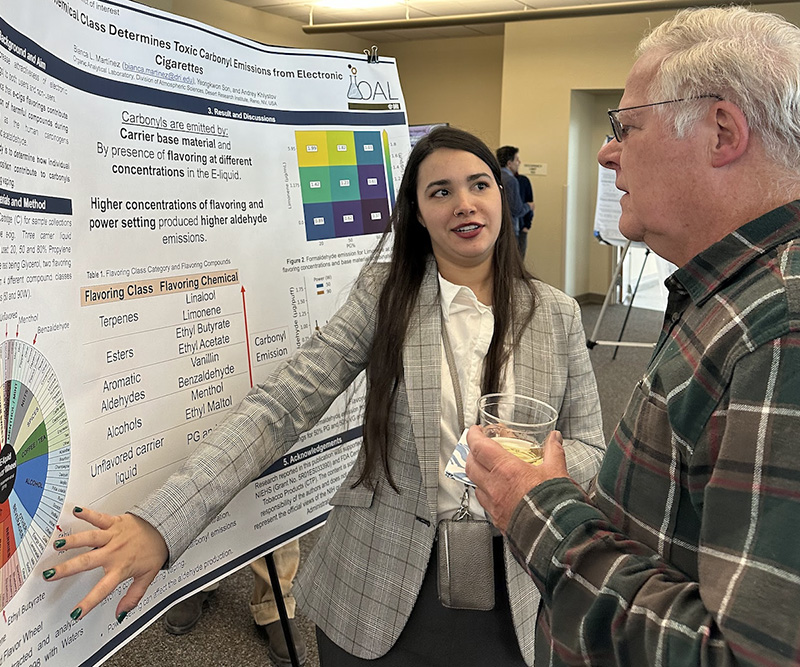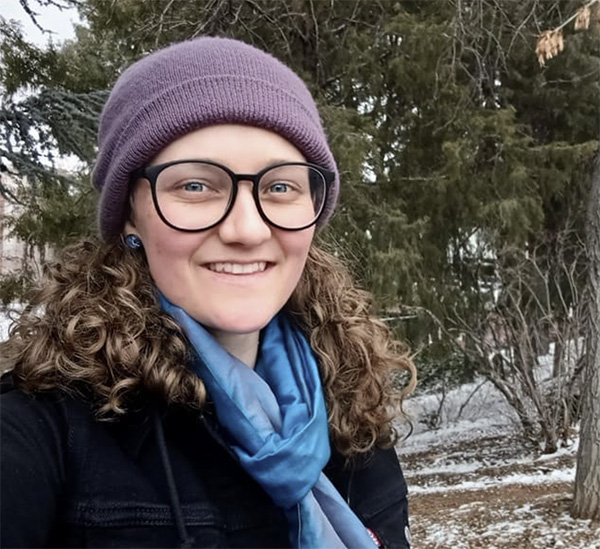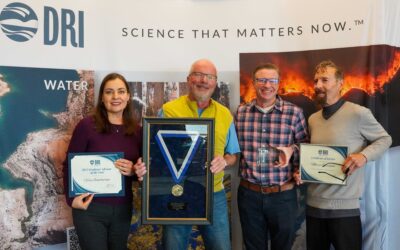On Friday, April 25th, 21 graduate students presented their research at DRI’s Reno campus for the annual poster presentation session. Organized by Kathleen Rodrigues, PhD, Assistant Research Professor of Luminescence, the poster session offers an opportunity for DRI-affiliated graduate students to network with each other and with DRI faculty, hone their presentation skills, and showcase the research they’re working on in pursuit of their degrees. Their scientific interests span a range of topics, from the public health risks of air pollution in the Arctic to measuring the water-capturing ability of forest canopies. The three winning students selected for their exceptional science communication skills are highlighted below.
For more information about ways to conduct graduate research at DRI while earning a degree through UNR or UNLV, visit https://www-dev.dri.edu/education-workforce-development/graduate-programs/.

Bianca Martinez
Advisor: Dr. Andrey Khlystov, DRI
Second year Ph.D. student in Atmospheric Science
Project Title: “Flavoring Chemical Class Determines Toxic Carbonyl Emissions from Electronic Cigarettes”
1. What problem is your research seeking to solve?
Flavorings increase attractiveness of electronic cigarettes (e-cigarettes) to both users and non-users. There is evidence that e-cigarette flavorings contribute to formation of harmful compounds during vaping, such as the human carcinogens formaldehyde and acetaldehyde. The aim of this study is to determine how individual flavoring composition contributes to carbonyls emissions during vaping.
2. What is the most important thing you want people to know about your research?
Exposure to harmful compounds, such as the carbonyls produced by e-cigarettes, poses a significant risk to users, even in small amounts. It is crucial to understand that these products can have serious health implications, including respiratory issues and long-term damage. The risks associated with e-cigarette use cannot be overstated, and it is essential to take these warnings seriously to protect your health.
3. What do you want your DRI colleagues to know about you?
I love knitting, reading a good book and sharing meaningful conversations over good coffee!

Abigail Sandquist
Advisor: Dr. Scott T. Allen, UNR
Fourth year Ph.D. student in Hydrology through the Graduate Program of Hydrologic Sciences. Plans to defend in summer 2025
Poster title: “Evaluating Spatiotemporal Variation in Canopy Storage Across Diversely Vegetated Sites”
1. What problem is your research seeking to solve?
My project aims to better understand how the water captured by forest canopies may vary in space and time with vegetation structure and meteorological conditions, with the ultimate goal to contribute to better representing this part of the water cycle across different ecosystems in large scale hydrologic models.
2. What is the most important thing you want people to know about your research?
This research is unique in that it is the first to evaluate rainfall interception and canopy storage measured in the field in the same way across multiple years and many diversely vegetated sites; previously only syntheses have been used to evaluate wide-scale spatial variation, in which methodology across studies is often inconsistent.
3. What do you want your DRI colleagues to know about you?
I would love to find a job in the Reno area that involves a diversity of tasks, that may include office, lab, and field work, data science, design, sensor work, or applied research. I also love to dance, and am always looking for new local dance communities to connect with!

Alyssa Radakovich
Advisor: Dr. Frank Yang, UNR
Third year Ph.D. student in Hydrogeology through the Graduate Program of Hydrologic Sciences.
Project Title: Priority legacy and emerging organofluorine compounds at Arctic formerly used defense sites, part of a larger study titled “Sustainable management of human organic pollutant exposure (HOPE) at formerly used defense sites in the changing Arctic.”
1. What problem is your research seeking to solve?
Our research addresses the increased human health risk caused by climate-driven release of persistent organic pollutants in the Arctic by quantifying exposure on Unalaska Island to guide targeted remediation and provide knowledge to make informed decisions about local resources and minimize the health hazards faced by local populations.
2. What is the most important thing you want people to know about your research?
The most important takeaway from our research so far is that Arctic communities near formerly used defense sites face potential health risks from exposure to diverse and understudied organofluorine compounds. Our study identified and prioritized these chemicals based on their presence, persistence, and potential toxicity, highlighting an urgent need for further investigation, effective risk management, and environmental remediation to protect human health and Arctic ecosystems.
3. What do you want your DRI colleagues to know about you?
I have two pet rabbits (Juniper and Douglas Fur)! I recently moved into a house with all wood floors, and I have created what I call a “bunny highway” out of carpet to entice them to explore more since their feet slip on the wood.


